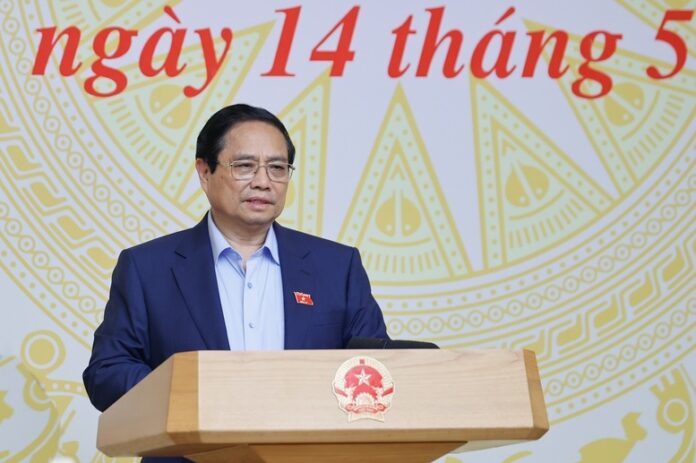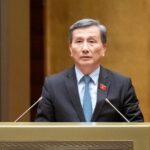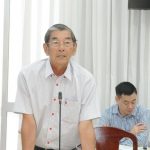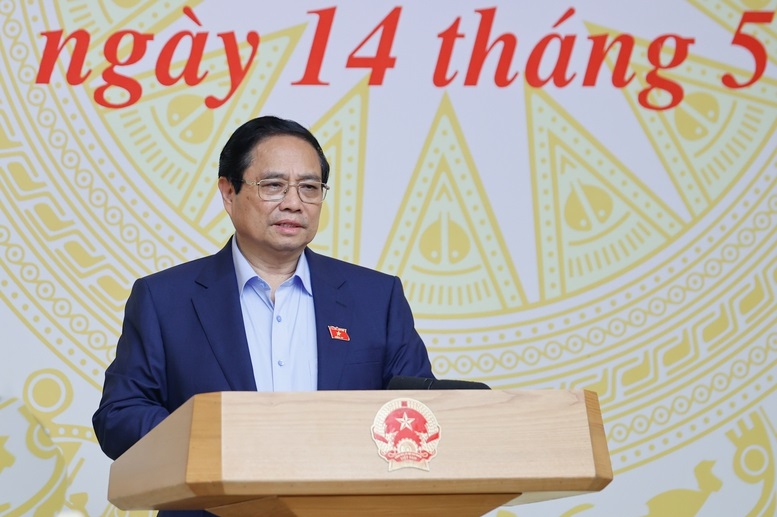
|
Prime Minister Pham Minh Chinh directs the establishment of a special task force and launches a high-intensity campaign to combat, suppress, prevent, and push back against smuggling, trade fraud, production and circulation of counterfeit and pirated goods, and violations of intellectual property rights from May 15 to June 15. – Photo: VGP/Nhat Bac
|
On the morning of May 14, Prime Minister Pham Minh Chinh chaired a meeting with ministries, sectors, and central agencies to evaluate the efforts against smuggling, trade fraud, counterfeit goods, and intellectual property rights violations in the first months of 2025 and discuss future orientations and tasks.
According to reports and opinions at the meeting, in the first months of 2025, units and localities have intensified efforts to combat smuggling, trade fraud, and counterfeit goods, handling over 34,000 cases of violations. This includes more than 8,200 cases of smuggling and trading in prohibited goods; over 25,100 cases of trade fraud and tax evasion; and more than 1,100 cases of counterfeiting and intellectual property rights violations. The handled cases resulted in the collection of over VND 4,897 billion for the state budget, and the initiation of criminal proceedings in nearly 1,400 cases, involving more than 2,100 subjects.
Moving forward, ministries, sectors, and agencies will continue to propagate and strictly implement the directives of the Government, the Prime Minister, and the National Steering Committee 389 on anti-smuggling, anti-trade fraud, and anti-counterfeit goods efforts.
They will develop programs, plans, and solutions for anti-smuggling, anti-trade fraud, and anti-counterfeit goods efforts that align with the situation and task requirements in their respective localities, with a particular focus on effectively combating and preventing illegal activities related to drug trading, gold and foreign currency smuggling, and the production and trade of goods with fake Vietnamese origins for export to other countries. Attention will also be given to counterfeiting and the production and trade of substandard and intellectual property-infringing goods.
Ministries and sectors will review legal documents and regulations related to anti-counterfeit and substandard goods efforts, promptly proposing amendments and supplements to address limitations and inadequacies and create a legal framework to enhance the effectiveness of anti-smuggling, anti-trade fraud, and anti-counterfeit goods efforts.
Functional forces will promote digital transformation and the application of information technology in anti-smuggling, anti-trade fraud, and anti-counterfeit goods efforts. They will strengthen connectivity, information sharing, and collaboration, as well as improve the effectiveness of hotlines to ensure timely collection and handling of reports from the people.
There will be enhanced inspection and supervision by ministries, sectors, and functional forces in charge of anti-smuggling, anti-trade fraud, and anti-counterfeit goods efforts. Accountability will be assigned to party committees and leaders of agencies and organizations in these efforts, and timely detection and strict handling will be implemented for individuals who collude with, protect, or cover up smuggling, trade fraud, and counterfeiting activities.
The National Steering Committee 389 and the Steering Committees 389 of ministries, sectors, and localities will be reorganized, and decisions and regulations on their activities will be amended to improve the effectiveness of anti-smuggling, anti-trade fraud, and anti-counterfeit goods efforts. Inter-sectoral inspection teams will be proactively established to monitor and supervise enterprises, organizations, and individuals in complying with relevant laws and regulations, promptly detecting and handling violators.
Stop, push back, and aim to put an end
Concluding the meeting, Prime Minister Pham Minh Chinh acknowledged the efforts and achievements of functional forces in the fight against smuggling, trade fraud, counterfeiting, intellectual property rights violations, and origin fraud. These positive results are commendable.
However, the prime minister pointed out that smuggling, trade fraud, counterfeiting, intellectual property rights violations, and origin fraud remain complex issues, with a wide range of subjects and nature, significantly impacting socio-economic development, people’s health, and the country’s reputation and brand. These issues also affect trust and cause public concern.
The prime minister identified several causes, including the lack of thorough and timely guidance and directives from some ministries, sectors, and localities; management loosening by some agencies; outdated regulations that have not been amended or supplemented in a timely manner; limited coordination and overlapping functions and tasks among agencies; and insufficient mobilization of the people’s strength.
In addition, there are gaps in people’s understanding due to limited information, guidance, and education. Violation handling has not been timely or thorough, and coordination between agencies has been inadequate at times. The rapid development of e-commerce has also outpaced management capacity. Furthermore, some individuals involved in the fight against these issues have themselves violated the law, as in the case of the former head of the Food Safety Department (Ministry of Health) who was recently arrested and detained.
Looking ahead, the prime minister stated that the situation is likely to become even more complex. He emphasized the goal of combating, preventing, pushing back, and aiming to put an end to smuggling, trade fraud, production and circulation of counterfeit and pirated goods, and violations of intellectual property rights and origin fraud.
By doing so, we will protect the legitimate rights and interests of the people and businesses, improve the material and spiritual life of the people, and contribute to the rapid and sustainable development of the country. This will also promote growth, consolidate macro-economic stability, ensure security and safety, and enhance national competitiveness, reputation, and brand.
Regarding the viewpoint on this task, the prime minister stressed that it is an important task for the entire political system, requiring the involvement of party committees and authorities at all levels and the mobilization of the people. It is a long-term task that must be carried out regularly, comprehensively, and continuously.
The prime minister emphasized that protecting the health and legitimate rights and interests of the people and consumers must be the top priority. Enhancing the effectiveness of anti-smuggling, anti-trade fraud, and anti-counterfeit goods efforts must be linked to the process of administrative boundary rearrangement and the organization of local governments at two levels, with a focus on streamlining the apparatus and improving management capacity and clearly defining the responsibilities of agencies to avoid overlap and omission.
Affirming that this issue is of great concern to the people and affects their health and rights, the prime minister urged for a breakthrough in preventing and combating smuggling, trade fraud, production and circulation of counterfeit and pirated goods, and violations of intellectual property rights and origin fraud. Ministries, sectors, and localities must take the initiative in leading, directing, building, and perfecting institutions, mechanisms, and policies, as well as in implementing, coordinating, inspecting, supervising, and handling violations. They should also pay attention to commending and rewarding timely, appropriately, objectively, and fairly.
Regarding specific tasks and solutions, the prime minister first requested the launch of a high-intensity campaign to combat, suppress, prevent, and push back against smuggling, trade fraud, production and circulation of counterfeit and pirated goods, and violations of intellectual property rights and origin fraud. The prime minister directed the establishment of a special task force led by Deputy Prime Minister Bui Thanh Son. Localities will also form task forces headed by their chairpersons, including representatives from relevant sectors, to deploy the campaign from May 15 to June 15, followed by an interim review.
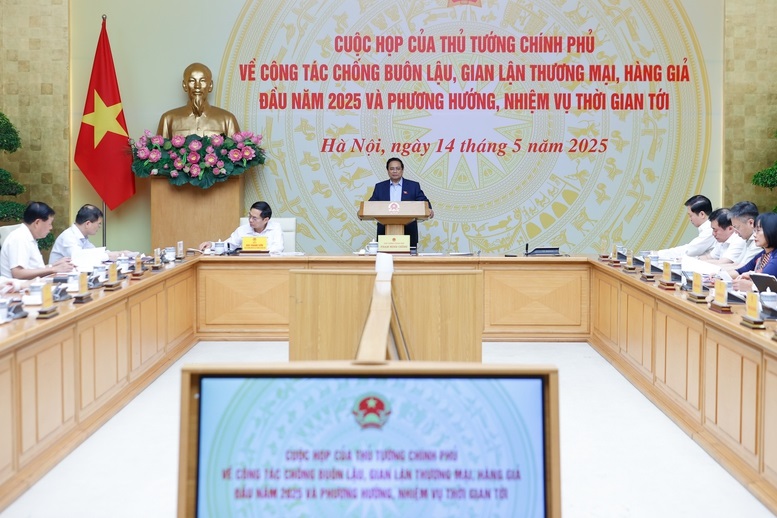
|
The prime minister emphasized that combating smuggling, trade fraud, counterfeiting, and intellectual property rights violations is an important task for the entire political system, requiring the involvement of party committees and authorities and the mobilization of the people. It is a long-term task that must be carried out regularly, comprehensively, and continuously. – Photo: VGP/Nhat Bac
|
Prevent advertisements with false claims like ‘cure-all medicine’
The prime minister assigned tasks to ministries and sectors, directing the Ministry of Home Affairs to review the functions and tasks of ministries and sectors to ensure legal completeness and prevent management loosening due to organizational restructuring or administrative boundary rearrangement.
The Ministry of Public Security was instructed to direct functional forces and local police to establish specialized cases and strictly handle violators. They should also coordinate with investigative agencies to expedite the investigation, prosecution, and trial of cases and publicly announce the results on mass media to deter and prevent similar violations. On this occasion, the prime minister commended the efforts and close monitoring of the public security force and outlined their heavy responsibilities in this regard in the coming time.
The Ministry of Finance will direct customs and tax forces to facilitate businesses while ensuring the prevention of violations within their functions, tasks, and powers.
The Ministry of Industry and Trade will collaborate with provincial People’s Committees to direct market management forces to handle violations. They will also improve e-commerce policies, review legal documents within their competence and propose amendments or supplements to circulars, and promptly submit to the Government for amendments or supplements to decrees and resolutions or to the National Assembly for amendments to relevant laws through the expedited procedure.
The Ministry of Industry and Trade will take the lead and coordinate with other ministries and sectors in directing market management forces to take primary responsibility and collaborate with inspection forces of sectors and localities in inspecting organizations and individuals’ compliance with the law in producing and trading goods and commercial services. Sectoral inspection forces of ministries, sectors, and localities will be responsible for licensing and management according to fields and localities, especially for medicines, milk, food, and other essential goods.
Along with this, specific tasks will be assigned to People’s Committees at the commune level to coordinate with sectoral inspection forces in inspecting and supervising production establishments in their areas. Efforts will be made to build an e-commerce law, amend the Law on Commerce, and revise the Decree on Goods Origin, as well as import and export-related decrees. Market management forces in localities will be reorganized, and studies will be conducted to propose agencies to take primary responsibility in handling violations in their areas.
The Ministry of Science and Technology will promptly review, amend, and supplement regulations related to intellectual property, addressing new issues, especially in the digital and e-commerce environment. They will enhance inspection and handling of organizations and individuals violating intellectual property rights and publishing false information about products.
The Ministry of Health will focus on preventing the entry of counterfeit and smuggled medicines of unknown origin into Vietnam, taking the lead and resolutely fighting to push back and put an end to counterfeit medicines. The health and protection of the people must be the top priority.
The Ministry of Health, the Ministry of Agriculture and Rural Development, and the Ministry of Industry and Trade will strengthen post-inspection and strictly handle violations, especially regarding counterfeit food and medicines. They will improve post-inspection regulations and licensing procedures, aiming for effective control while ensuring flexibility, actively applying digital transformation, and building databases. Efforts will be made to build a Food Safety Law and amend outdated decrees and circulars, strengthen sanctions, promote voluntary compliance among relevant entities, and encourage public support.
The Ministry of Agriculture and Rural Development will enhance inspection and strict handling of violations related to forestry, aquatic, and agricultural products, seeds, fertilizers, and plant protection drugs. They will also focus on controlling the use of stimulants and chemicals and promoting the development of trademarks, planning, and expansion of markets for agricultural and aquatic products.
The Ministry of Culture, Sports and Tourism will study and supplement sanctions for individuals who abuse their influence to make false claims, especially on online platforms, and collaborate with relevant agencies to prevent advertisements with false claims like ‘cure-all medicine.’
The Ministry of Justice will coordinate with ministries and sectors to promote, supplement, and perfect institutions to manage and promote production and business development.
People’s Committees of provinces and cities will direct market management forces to strictly handle violations in their areas, promote socio-economic development, especially in remote and border areas, and collaborate with border guards and police to strengthen border management, ensuring social order and safety and preventing smuggling and trade fraud.
Media agencies, including VTV, VOV, VNA, and other press agencies, along with functional forces, will strengthen communication and propaganda on this work, explaining the harm caused by violations and mobilizing the strength of the people. They will also review and control advertising activities.
The prime minister called for the launch of an emulation movement to combat smuggling, trade fraud, production and circulation of counterfeit and pirated goods, and violations of intellectual property rights. He emphasized the need for high determination, great efforts, and decisive and effective actions with a focus on key tasks and areas. Clear assignment of tasks and responsibilities is essential: “Clear in people, clear in tasks, clear in time, clear in responsibilities, clear in authority, and clear in products.”
Clearer Criteria Needed to Distinguish Between Three Types of Digital Assets: Virtual, Crypto, and Other Digital Possessions.
“During the afternoon session on May 9, discussions on the draft Law on Digital Technology Industry, pertaining to regulations on digital assets, took place. National Assembly Deputy Dong Ngoc Ba proposed a clearer distinction between three groups of digital assets: virtual assets, encrypted assets, and other digital assets.”
Gold Shops Caught Violating Regulations, Fined Nearly 3 Billion VND
The Market Management Force will continue to implement Directive No. 23/CD-TTg of the Prime Minister regarding the implementation of the urgent measures to manage the gold market
The Rice Scandal: Lessons Learned from the World’s Finest Vietnamese Rice
Deputy Minister of Agriculture and Rural Development Tran Thanh Nam believes that the incident of ST25 rice being registered for exclusive protection by a foreign entity should serve as a harsh lesson for businesses to take matters into their own hands in order to protect themselves. This serves as a wake-up call for the development of Vietnamese agricultural product branding.

